世界十大著名心理测试
著名的心理测试题目

著名的心理测试题目1. 墨迹测试:- 描述:展示一系列墨迹图片,要求测试者描述他们看到的图像或故事。
- 目的:评估测试者的潜意识思维和情感状态。
2. 罗夏克墨迹测试:- 描述:类似于墨迹测试,但使用特定的墨迹图案,测试者需要描述他们看到的图像。
- 目的:揭示测试者的内心世界和心理状态。
3. 明尼苏达多项人格问卷(MMPI):- 描述:一系列问题,旨在评估测试者的人格特征和潜在心理问题。
- 目的:诊断心理障碍和人格障碍。
4. 斯特恩伯格三角爱情测试:- 描述:评估测试者对爱情的看法,包括亲密、激情和承诺三个维度。
- 目的:了解测试者的爱情态度和关系模式。
5. 艾森克人格问卷(EPQ):- 描述:一系列问题,评估测试者的外向性、神经质和精神质。
- 目的:了解测试者的人格特质。
6. 16种人格因素问卷(16PF):- 描述:评估测试者的16种基本人格特质。
- 目的:了解测试者的个性特征和潜在优势。
7. 霍兰德职业兴趣测试:- 描述:一系列问题,评估测试者的职业兴趣和倾向。
- 目的:帮助测试者了解自己的职业倾向和适合的工作类型。
8. 大五人格测试:- 描述:评估测试者的开放性、责任心、外向性、宜人性和神经质。
- 目的:全面了解测试者的人格特质。
9. 自我监控量表:- 描述:评估测试者在不同社交情境中调整自己行为的能力。
- 目的:了解测试者的自我监控能力。
10. 生活满意度量表:- 描述:一系列问题,评估测试者对当前生活的整体满意度。
- 目的:了解测试者的幸福感和生活满意度。
请注意,进行心理测试时应由专业心理医生或心理咨询师指导,以确保测试的准确性和测试结果的正确解读。
世界上超准的测试题

世界上超准的测试题近年来,各种类型的测试题如雨后春笋般涌现,但能够被称为“世界上超准的测试题”的并不多见。
本文将介绍一些被广泛认可并具有高准确性的测试题,这些测试题在不同领域均有应用,并对测试结果有重要参考价值。
一、心理测试题1. 马赛克心理测试题马赛克心理测试题源自于心理学家卡尔·尤恩斯的研究,旨在通过观察被测试者对马赛克图案的情感反应来揭示他们的心理状态。
被测试者需观看一组马赛克图案,并在一定时间内记录下自己的感觉和想法。
通过对这些记录的分析,心理学家可以推断出被测试者在认知、情感、意识等方面的特点和倾向。
2. 克里森科技心理测试题克里森科技心理测试题是一种基于人工智能技术的心理测试方法。
被测试者通过使用克里森科技的APP进行测试,APP会根据被测试者的回答和行为,结合大数据分析、模式识别等技术,生成详细的心理分析报告。
这些报告能够准确揭示被测试者的性格、情绪、压力等方面的信息,为个人成长和心理健康提供重要指导。
二、个人能力测试题1. 智力测验题智力测验题是衡量被测试者智力水平的经典方法之一。
其中,韦氏智力测验和斯坦福-比奈特智力测验是应用最广泛的两种。
这些测验通过考察被测试者在语言理解、数学推理、空间感知等方面的能力,来评估他们的智商水平。
这些测验题所涉及的题型多样,例如数列推理、图形拼凑等,能够全面而准确地反映被测试者的智力状态。
2. 职业能力测验题职业能力测验题是用于评估被测试者在特定领域内的专业能力的工具。
它们根据不同职业所需的技能和知识,设计出一系列与之相对应的测试题,评估被测试者在该领域内的掌握程度。
例如,对于一名软件工程师,职业能力测试题可能包括编程题、算法设计题等,通过分析被测试者在这些题目上的表现,能够较为准确地判断其在软件开发方面的能力水平。
三、医学测试题1. 皮肤科测试题皮肤科测试题常用于评估被测试者的皮肤健康状况和相关疾病风险。
例如,脂漏性皮炎测试题可以通过被测试者对不同皮肤症状的发生频率和程度进行选择,并结合个人生活习惯和环境因素等,给出相应的皮肤健康建议。
十大金牌心理测试题及答案
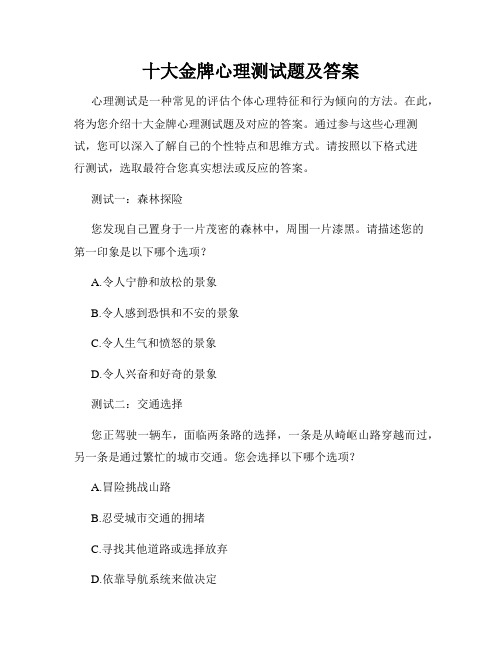
十大金牌心理测试题及答案心理测试是一种常见的评估个体心理特征和行为倾向的方法。
在此,将为您介绍十大金牌心理测试题及对应的答案。
通过参与这些心理测试,您可以深入了解自己的个性特点和思维方式。
请按照以下格式进行测试,选取最符合您真实想法或反应的答案。
测试一:森林探险您发现自己置身于一片茂密的森林中,周围一片漆黑。
请描述您的第一印象是以下哪个选项?A.令人宁静和放松的景象B.令人感到恐惧和不安的景象C.令人生气和愤怒的景象D.令人兴奋和好奇的景象测试二:交通选择您正驾驶一辆车,面临两条路的选择,一条是从崎岖山路穿越而过,另一条是通过繁忙的城市交通。
您会选择以下哪个选项?A.冒险挑战山路B.忍受城市交通的拥堵C.寻找其他道路或选择放弃D.依靠导航系统来做决定测试三:海洋冒险您睡觉时梦到自己在一艘船上,船正在遭遇风暴,您感到害怕和担忧。
这时,您突然听到船上有人喊:“我们需要你的帮助!”您最有可能选择以下哪个行动?A.迅速想方设法寻找解决问题的方法B.保持冷静并寻求其他船员的建议C.尽力帮助其他人,但留心自身安全D.试图掌控情绪,以便更好地应对危机测试四:空间感知您在一个陌生的城市中徘徊,突然意识到自己迷路了。
您会选择以下哪种行为?A.寻找附近的地标或标志物,以便找到正确的方向B.向附近的路人寻求帮助或问路C.尽量回想起之前的路径,并试图找回去D.打开导航软件或寻找街道指示牌测试五:颜色偏好您最喜欢以下哪种颜色?A.蓝色B.红色C.绿色D.黄色测试六:社交场景您被邀请参加一场盛大的派对,充满了陌生人和熟人。
在这样的场合,您更倾向于以下哪种行为?A.主动介绍自己并积极与他人交流B.寻找与自己兴趣相投的人进行深入交谈C.选择与几个熟人聚在一起,感觉更舒适D.找一个角落独处,观察他人而不亲自参与测试七:人际冲突您与一位不合作的同事在一个项目上产生了分歧,您最可能采取以下哪个策略?A.解释自己的观点并试图说服对方接受B.寻求中立的第三方来调解冲突C.寻找妥协的解决方案,以平息局势D.选择与对方保持距离,避免进一步冲突测试八:时间管理当您有很多任务要完成时,您更倾向于以下哪种策略?A.根据优先级制定详细的计划,并按计划执行B.逐个完成任务,不考虑时间紧迫性C.寻找其他人的帮助或委托任务D.根据当下的心情或动力来选择任务开始测试九:风险承受您对以下哪种活动更感兴趣和放松?A.攀岩或跳伞等极限运动B.听音乐或观看电影/电视剧C.读书或写作D.与朋友共进晚餐或参加社交活动测试十:自我评价您认为自己的态度是以下哪种类型?A.乐观积极B.理性客观C.敏感细腻D.独立自主答案解析:测试一:您对环境中的第一印象可能代表您对生活的态度和情感反应。
世界十大著名心理实验
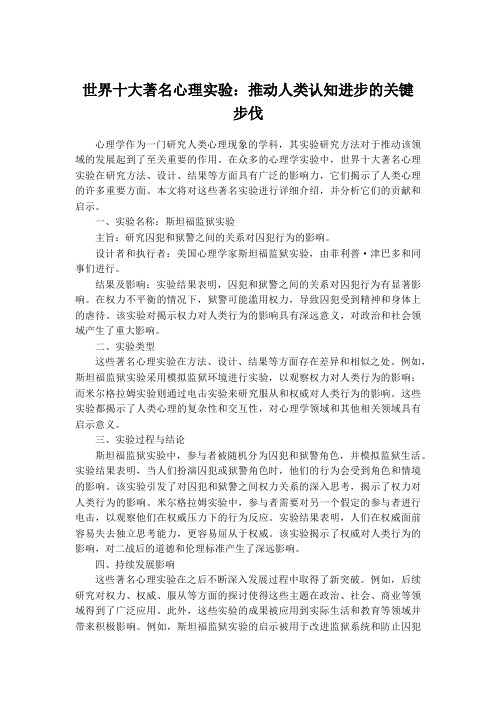
世界十大著名心理实验:推动人类认知进步的关键步伐心理学作为一门研究人类心理现象的学科,其实验研究方法对于推动该领域的发展起到了至关重要的作用。
在众多的心理学实验中,世界十大著名心理实验在研究方法、设计、结果等方面具有广泛的影响力,它们揭示了人类心理的许多重要方面。
本文将对这些著名实验进行详细介绍,并分析它们的贡献和启示。
一、实验名称:斯坦福监狱实验主旨:研究囚犯和狱警之间的关系对囚犯行为的影响。
设计者和执行者:美国心理学家斯坦福监狱实验,由菲利普·津巴多和同事们进行。
结果及影响:实验结果表明,囚犯和狱警之间的关系对囚犯行为有显著影响。
在权力不平衡的情况下,狱警可能滥用权力,导致囚犯受到精神和身体上的虐待。
该实验对揭示权力对人类行为的影响具有深远意义,对政治和社会领域产生了重大影响。
二、实验类型这些著名心理实验在方法、设计、结果等方面存在差异和相似之处。
例如,斯坦福监狱实验采用模拟监狱环境进行实验,以观察权力对人类行为的影响;而米尔格拉姆实验则通过电击实验来研究服从和权威对人类行为的影响。
这些实验都揭示了人类心理的复杂性和交互性,对心理学领域和其他相关领域具有启示意义。
三、实验过程与结论斯坦福监狱实验中,参与者被随机分为囚犯和狱警角色,并模拟监狱生活。
实验结果表明,当人们扮演囚犯或狱警角色时,他们的行为会受到角色和情境的影响。
该实验引发了对囚犯和狱警之间权力关系的深入思考,揭示了权力对人类行为的影响。
米尔格拉姆实验中,参与者需要对另一个假定的参与者进行电击,以观察他们在权威压力下的行为反应。
实验结果表明,人们在权威面前容易失去独立思考能力,更容易屈从于权威。
该实验揭示了权威对人类行为的影响,对二战后的道德和伦理标准产生了深远影响。
四、持续发展影响这些著名心理实验在之后不断深入发展过程中取得了新突破。
例如,后续研究对权力、权威、服从等方面的探讨使得这些主题在政治、社会、商业等领域得到了广泛应用。
十个著名的心理测试
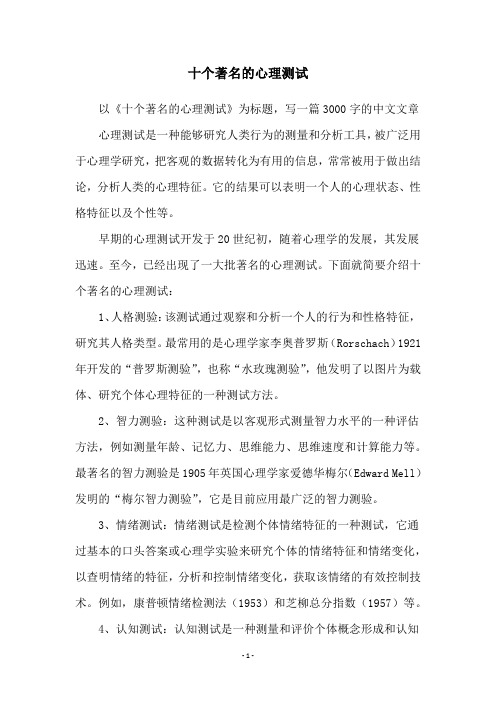
十个著名的心理测试以《十个著名的心理测试》为标题,写一篇3000字的中文文章心理测试是一种能够研究人类行为的测量和分析工具,被广泛用于心理学研究,把客观的数据转化为有用的信息,常常被用于做出结论,分析人类的心理特征。
它的结果可以表明一个人的心理状态、性格特征以及个性等。
早期的心理测试开发于20世纪初,随着心理学的发展,其发展迅速。
至今,已经出现了一大批著名的心理测试。
下面就简要介绍十个著名的心理测试:1、人格测验:该测试通过观察和分析一个人的行为和性格特征,研究其人格类型。
最常用的是心理学家李奥普罗斯(Rorschach)1921年开发的“普罗斯测验”,也称“水玫瑰测验”,他发明了以图片为载体、研究个体心理特征的一种测试方法。
2、智力测验:这种测试是以客观形式测量智力水平的一种评估方法,例如测量年龄、记忆力、思维能力、思维速度和计算能力等。
最著名的智力测验是1905年英国心理学家爱德华梅尔(Edward Mell)发明的“梅尔智力测验”,它是目前应用最广泛的智力测验。
3、情绪测试:情绪测试是检测个体情绪特征的一种测试,它通过基本的口头答案或心理学实验来研究个体的情绪特征和情绪变化,以查明情绪的特征,分析和控制情绪变化,获取该情绪的有效控制技术。
例如,康普顿情绪检测法(1953)和芝柳总分指数(1957)等。
4、认知测试:认知测试是一种测量和评价个体概念形成和认知能力的有效方法。
它通过考察个体对问题的解决或处理能力,以及对抽象概念的理解程度来衡量认知能力,主要包括认知发展测验(1924)、文艺认知技能测验(1936)和加里认知理论测验(1947)等。
5、成就测试:它是以测量个体的思维力和能力水平为目的,以及通过特定技能来识别其能力水平的测试,它往往被用于判断个体从小学到大学的学生|发展情况,成就测试类型包括国家技术能力测验(1926)、普尔斯作业水平测验(1936)、海明斯和马斯特尔统计学习测验(1948)和桃李综合测验(1949)等。
世界十大著名心理测试
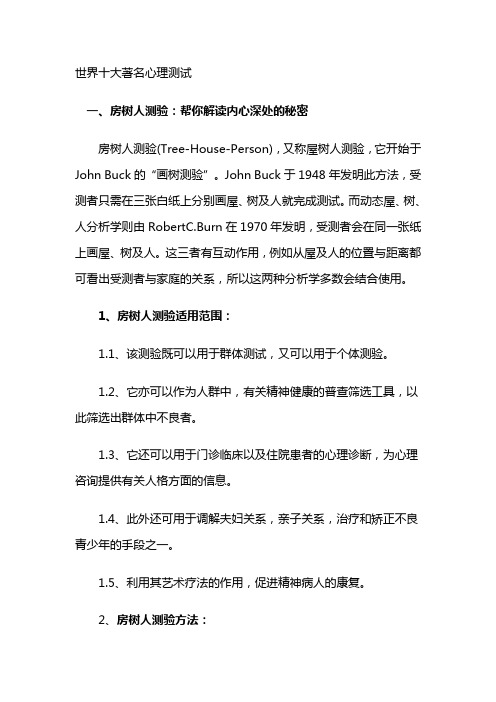
世界十大著名心理测试一、房树人测验:帮你解读内心深处的秘密房树人测验(Tree-House-Person),又称屋树人测验,它开始于John Buck的“画树测验”。
John Buck于1948年发明此方法,受测者只需在三张白纸上分别画屋、树及人就完成测试。
而动态屋、树、人分析学则由RobertC.Burn在1970年发明,受测者会在同一张纸上画屋、树及人。
这三者有互动作用,例如从屋及人的位置与距离都可看出受测者与家庭的关系,所以这两种分析学多数会结合使用。
1、房树人测验适用范围:1.1、该测验既可以用于群体测试,又可以用于个体测验。
1.2、它亦可以作为人群中,有关精神健康的普查筛选工具,以此筛选出群体中不良者。
1.3、它还可以用于门诊临床以及住院患者的心理诊断,为心理咨询提供有关人格方面的信息。
1.4、此外还可用于调解夫妇关系,亲子关系,治疗和矫正不良青少年的手段之一。
1.5、利用其艺术疗法的作用,促进精神病人的康复。
2、房树人测验方法:2.1、测试前的准备:准备测验纸、A4纸,没有橡皮胶的铅笔一枝(2B)。
2.2、要求:画好的线条不可用橡皮胶擦掉,但可以重画;画完一部份或整幅图画后,不得重画;想怎么画就怎么画,但必须有房子、树、人;画人的时侯,不可以画火柴人;画图时不可用尺子;构思的时间最好不要超过五分钟3、房树人测验结果分析:3.1、屋树人图在白纸中的位置分析:居中:受测者自我意识较强,以自我为中心;偏左:受测者留恋过去;偏右:受测者憧憬未来;偏上:受测者喜欢幻想;偏下:受测者注重现实,对安全较为关注;画在角落:受测者可能有病理性疾病。
3.2、房屋形象分析:房屋是人们成长的场所,投射内心的安全感,表示渴望归属的地方。
房屋形象一般代表作画者的家,或理想之家,也代表身体、精神家园。
画楼房:智商较高;房子画得像庙宇:两个极端,要不就是人才,或者就是怪异的行为表达;强调地面:缺乏安全感;瓦片画得很仔细:追求细节和完美;房子侧面画楼梯:想回避和间接性接触;画烟囱:向上的直烟暗示受测者需要出气筒;向上的烟代表受测者内心的压力;一般人画的烟方向会向右,如果向左可能有精神分裂的倾向。
十大心理测试题及答案大全

十大心理测试题及答案大全心理测试是通过一系列问题,来测试个体的心理特征和状态。
它可以帮助人们更好地了解自己的个性、特点和潜力,也可以用于招聘面试、心理咨询等方面。
本文将为您介绍十大心理测试题及答案大全,希望能帮助您更好地了解自己。
题目一:莫斯科大教堂问题:请描述一下您对莫斯科大教堂的第一印象。
答案分析:莫斯科大教堂是一座宏伟壮观的建筑,通体洁白,金光闪闪。
如果您的描述中充满了对其美感的赞叹和震撼,说明您有较高的审美观点和艺术欣赏能力。
题目二:抽象图案问题:请问您在下列抽象图案中是否能找到一个完整的形状?答案分析:这个问题是测试您的观察力和细致程度。
如果您能迅速发现一个完整的形状,说明您具备较强的洞察力和专注力。
题目三:夜晚的森林问题:您在一个完全陌生的森林中迷路了,请问您会如何应对?答案分析:这个问题测试您在面对困境时的处理方式。
如果您选择迎头赶路并寻找合适的出路,说明您具备较强的自信心和解决问题的能力。
问题:请问您绘画时最常画的内容是什么?为什么?答案分析:这个问题试图探究您在绘画时的选择和动机。
如果您经常画大自然的景色或者美食,说明您对生活充满热情,喜欢追求美好的事物。
题目五:旅行问题:如果可以选择一个国家旅行,您会选择哪个国家?为什么?答案分析:这个问题测试您对异国文化的认可和好奇心。
如果您选择一个与自己国家文化差异较大的国家,说明您对探索未知和接触新事物具有强烈的欲望。
题目六:照片排列问题:请您按照自己的喜好和感觉排列下列这组照片。
答案分析:这个问题试图了解您对事物的整体认知和归类方式。
如果您按照颜色、主题或情感进行排列,说明您具有较强的整体观察和分辨能力。
题目七:忍者问题:如果您成为一名忍者,您希望拥有哪种特殊能力?答案分析:这个问题测试您对自身能力的期待和追求。
如果您选择隐身和操控火焰等特殊能力,说明您渴望自己能够具备强大而独特的能力。
问题:听到海浪声后,您会联想到什么?答案分析:这个问题试图了解您对海洋的感知和情感反应。
最惊人的十个心理测试
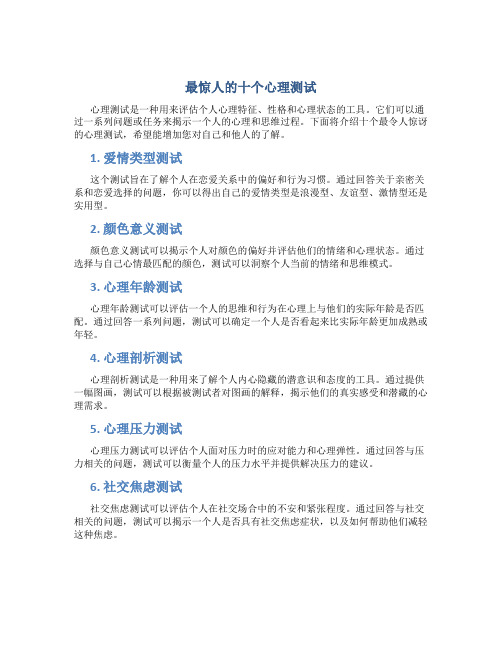
最惊人的十个心理测试心理测试是一种用来评估个人心理特征、性格和心理状态的工具。
它们可以通过一系列问题或任务来揭示一个人的心理和思维过程。
下面将介绍十个最令人惊讶的心理测试,希望能增加您对自己和他人的了解。
1. 爱情类型测试这个测试旨在了解个人在恋爱关系中的偏好和行为习惯。
通过回答关于亲密关系和恋爱选择的问题,你可以得出自己的爱情类型是浪漫型、友谊型、激情型还是实用型。
2. 颜色意义测试颜色意义测试可以揭示个人对颜色的偏好并评估他们的情绪和心理状态。
通过选择与自己心情最匹配的颜色,测试可以洞察个人当前的情绪和思维模式。
3. 心理年龄测试心理年龄测试可以评估一个人的思维和行为在心理上与他们的实际年龄是否匹配。
通过回答一系列问题,测试可以确定一个人是否看起来比实际年龄更加成熟或年轻。
4. 心理剖析测试心理剖析测试是一种用来了解个人内心隐藏的潜意识和态度的工具。
通过提供一幅图画,测试可以根据被测试者对图画的解释,揭示他们的真实感受和潜藏的心理需求。
5. 心理压力测试心理压力测试可以评估个人面对压力时的应对能力和心理弹性。
通过回答与压力相关的问题,测试可以衡量个人的压力水平并提供解决压力的建议。
6. 社交焦虑测试社交焦虑测试可以评估个人在社交场合中的不安和紧张程度。
通过回答与社交相关的问题,测试可以揭示一个人是否具有社交焦虑症状,以及如何帮助他们减轻这种焦虑。
7. 情绪智商测试情绪智商测试可以评估个人识别、理解和管理情绪的能力。
通过回答与情绪智商相关的问题,测试可以衡量个人的情绪意识水平和情绪调节的能力。
8. 人格类型测试人格类型测试可以评估个人的性格特征和倾向。
通过回答关于行为、价值观和兴趣的问题,测试可以确定个人的人格类型,例如内向型、外向型、感知型或判断型等。
9. 睡眠质量测试睡眠质量测试可以评估个人的睡眠习惯和质量。
通过回答与睡眠相关的问题,测试可以帮助个人了解自己的睡眠质量,识别潜在的睡眠问题,并提供改善睡眠的建议。
世界十大著名心理测试

世界十大著名心理测试一、房树人测验:帮你解读内心深处的秘密房树人测验(Tree-House-Person),又称屋树人测验,它开始于John Buck的“画树测验”。
John Buck于1948年发明此方法,受测者只需在三张白纸上分别画屋、树及人就完成测试。
而动态屋、树、人分析学则由RobertC.Burn在1970年发明,受测者会在同一张纸上画屋、树及人。
这三者有互动作用,例如从屋及人的位置与距离都可看出受测者与家庭的关系,所以这两种分析学多数会结合使用。
1、房树人测验适用范围:1.1、该测验既可以用于群体测试,又可以用于个体测验。
1.2、它亦可以作为人群中,有关精神健康的普查筛选工具,以此筛选出群体中不良者。
1.3、它还可以用于门诊临床以及住院患者的心理诊断,为心理咨询提供有关人格方面的信息。
1.4、此外还可用于调解夫妇关系,亲子关系,治疗和矫正不良青少年的手段之一。
1.5、利用其艺术疗法的作用,促进精神病人的康复。
2、房树人测验方法:2.1、测试前的准备:准备测验纸、A4纸,没有橡皮胶的铅笔一枝(2B)。
2.2、要求:画好的线条不可用橡皮胶擦掉,但可以重画;画完一部份或整幅图画后,不得重画;想怎么画就怎么画,但必须有房子、树、人;画人的时侯,不可以画火柴人;画图时不可用尺子;构思的时间最好不要超过五分钟3、房树人测验结果分析:3.1、屋树人图在白纸中的位置分析:居中:受测者自我意识较强,以自我为中心;偏左:受测者留恋过去;偏右:受测者憧憬未来;偏上:受测者喜欢幻想;偏下:受测者注重现实,对安全较为关注;画在角落:受测者可能有病理性疾病。
3.2、房屋形象分析:房屋是人们成长的场所,投射内心的安全感,表示渴望归属的地方。
房屋形象一般代表作画者的家,或理想之家,也代表身体、精神家园。
画楼房:智商较高;房子画得像庙宇:两个极端,要不就是人才,或者就是怪异的行为表达;强调地面:缺乏安全感;瓦片画得很仔细:追求细节和完美;房子侧面画楼梯:想回避和间接性接触;画烟囱:向上的直烟暗示受测者需要出气筒;向上的烟代表受测者内心的压力;一般人画的烟方向会向右,如果向左可能有精神分裂的倾向。
世界十大著名心理测试故事
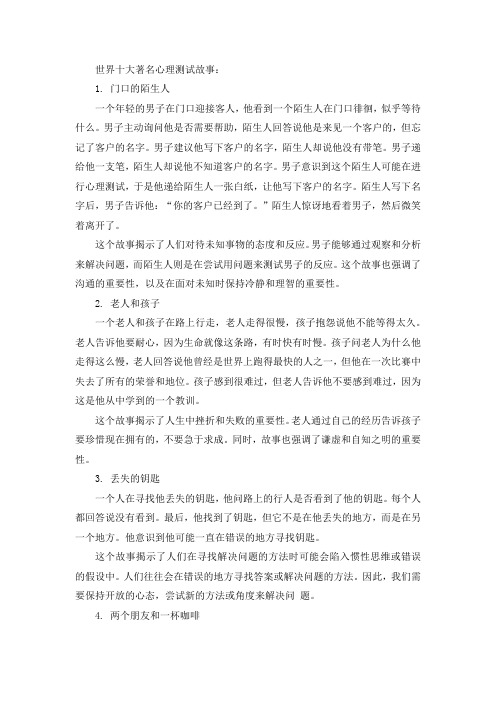
世界十大著名心理测试故事:1. 门口的陌生人一个年轻的男子在门口迎接客人,他看到一个陌生人在门口徘徊,似乎等待什么。
男子主动询问他是否需要帮助,陌生人回答说他是来见一个客户的,但忘记了客户的名字。
男子建议他写下客户的名字,陌生人却说他没有带笔。
男子递给他一支笔,陌生人却说他不知道客户的名字。
男子意识到这个陌生人可能在进行心理测试,于是他递给陌生人一张白纸,让他写下客户的名字。
陌生人写下名字后,男子告诉他:“你的客户已经到了。
”陌生人惊讶地看着男子,然后微笑着离开了。
这个故事揭示了人们对待未知事物的态度和反应。
男子能够通过观察和分析来解决问题,而陌生人则是在尝试用问题来测试男子的反应。
这个故事也强调了沟通的重要性,以及在面对未知时保持冷静和理智的重要性。
2. 老人和孩子一个老人和孩子在路上行走,老人走得很慢,孩子抱怨说他不能等得太久。
老人告诉他要耐心,因为生命就像这条路,有时快有时慢。
孩子问老人为什么他走得这么慢,老人回答说他曾经是世界上跑得最快的人之一,但他在一次比赛中失去了所有的荣誉和地位。
孩子感到很难过,但老人告诉他不要感到难过,因为这是他从中学到的一个教训。
这个故事揭示了人生中挫折和失败的重要性。
老人通过自己的经历告诉孩子要珍惜现在拥有的,不要急于求成。
同时,故事也强调了谦虚和自知之明的重要性。
3. 丢失的钥匙一个人在寻找他丢失的钥匙,他问路上的行人是否看到了他的钥匙。
每个人都回答说没有看到。
最后,他找到了钥匙,但它不是在他丢失的地方,而是在另一个地方。
他意识到他可能一直在错误的地方寻找钥匙。
这个故事揭示了人们在寻找解决问题的方法时可能会陷入惯性思维或错误的假设中。
人们往往会在错误的地方寻找答案或解决问题的方法。
因此,我们需要保持开放的心态,尝试新的方法或角度来解决问题。
4. 两个朋友和一杯咖啡两个朋友在咖啡店里喝咖啡,其中一个朋友突然说:“我最近总是感到很疲倦。
”另一个朋友建议他去看医生或去健身房锻炼。
十大心理实验
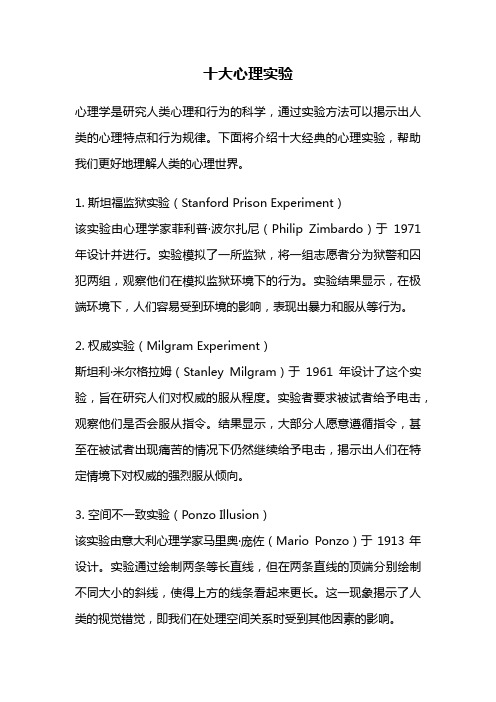
十大心理实验心理学是研究人类心理和行为的科学,通过实验方法可以揭示出人类的心理特点和行为规律。
下面将介绍十大经典的心理实验,帮助我们更好地理解人类的心理世界。
1. 斯坦福监狱实验(Stanford Prison Experiment)该实验由心理学家菲利普·波尔扎尼(Philip Zimbardo)于1971年设计并进行。
实验模拟了一所监狱,将一组志愿者分为狱警和囚犯两组,观察他们在模拟监狱环境下的行为。
实验结果显示,在极端环境下,人们容易受到环境的影响,表现出暴力和服从等行为。
2. 权威实验(Milgram Experiment)斯坦利·米尔格拉姆(Stanley Milgram)于1961年设计了这个实验,旨在研究人们对权威的服从程度。
实验者要求被试者给予电击,观察他们是否会服从指令。
结果显示,大部分人愿意遵循指令,甚至在被试者出现痛苦的情况下仍然继续给予电击,揭示出人们在特定情境下对权威的强烈服从倾向。
3. 空间不一致实验(Ponzo Illusion)该实验由意大利心理学家马里奥·庞佐(Mario Ponzo)于1913年设计。
实验通过绘制两条等长直线,但在两条直线的顶端分别绘制不同大小的斜线,使得上方的线条看起来更长。
这一现象揭示了人类的视觉错觉,即我们在处理空间关系时受到其他因素的影响。
4. 批量同化实验(Asch Conformity Experiment)索洛蒙·阿什(Solomon Asch)于1951年进行了这个实验,旨在研究个体在面对集体压力时是否会改变自己的判断。
实验者让被试者在一组明显错误的答案中选择正确答案。
结果显示,当其他人都选择错误答案时,被试者往往会选择与大多数人一致的答案,揭示出人类的从众心理。
5. 权衡选择实验(Tversky and Kahneman)丹尼尔·卡尼曼(Daniel Kahneman)和阿莫斯·特沃斯基(Amos Tversky)合作进行了一系列实验,揭示了人们在决策过程中的偏见和错误。
世界十大著名心理测试
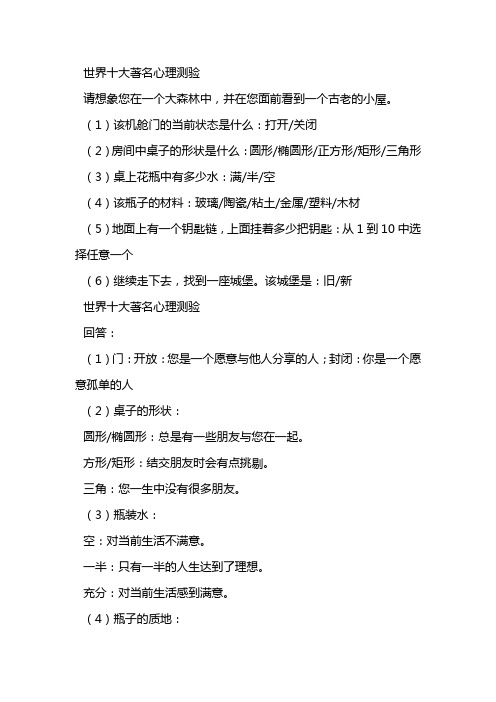
世界十大著名心理测验请想象您在一个大森林中,并在您面前看到一个古老的小屋。
(1)该机舱门的当前状态是什么:打开/关闭(2)房间中桌子的形状是什么:圆形/椭圆形/正方形/矩形/三角形(3)桌上花瓶中有多少水:满/半/空(4)该瓶子的材料:玻璃/陶瓷/粘土/金属/塑料/木材(5)地面上有一个钥匙链,上面挂着多少把钥匙:从1到10中选择任意一个(6)继续走下去,找到一座城堡。
该城堡是:旧/新世界十大著名心理测验回答:(1)门:开放:您是一个愿意与他人分享的人;封闭:你是一个愿意孤单的人(2)桌子的形状:圆形/椭圆形:总是有一些朋友与您在一起。
方形/矩形:结交朋友时会有点挑剔。
三角:您一生中没有很多朋友。
(3)瓶装水:空:对当前生活不满意。
一半:只有一半的人生达到了理想。
充分:对当前生活感到满意。
(4)瓶子的质地:玻璃/粘土/陶瓷:您是一个脆弱的人。
金属/塑料/木材:您是坚强的人。
(5)键:1:生活中只有一个好朋友。
2-5:您的生活中有一些好朋友。
6 – 10:您的生活中有很多好朋友。
(6)城堡:老:过去的关系很糟糕。
新:过去有很好的关系。
心理趣味测验身体运动可以反映一个人的心理或性格。
如果有人要求您伸出手,您将执行以下哪些操作?一个。
手掌向下,分开五个手指。
手掌向下,手指并拢C。
手掌向上,手指分开。
掌心向上,手指并拢世界十大著名心理测验检测结果选择A:您喜欢简单,不喜欢麻烦和疲倦;健忘不会怀恨在心,只要您不触及底线,一切都会过去。
选项B:您善于思考别人,经常尝试改变自己以迎合他们。
在外面,你热情而热情,在里面追求舒适的环境。
选择C:您是一个无法预测的人。
您隐藏了自己的悲伤,但又想从别人那里得到安慰和爱。
您害怕被忽略,也不会关心别人。
选择D:您是一个吃软但不吃硬的人,经常虚伪,情绪化且缺乏安全感;您总是会回应朋友的帮助请求。
十大有名的心理测试
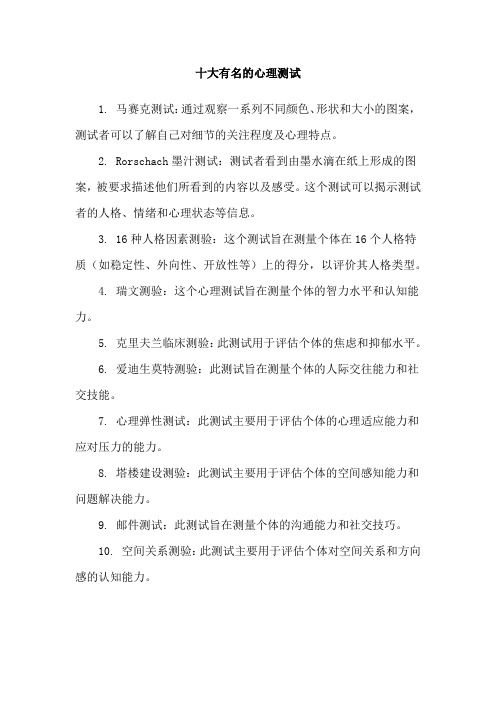
十大有名的心理测试
1. 马赛克测试:通过观察一系列不同颜色、形状和大小的图案,测试者可以了解自己对细节的关注程度及心理特点。
2. Rorschach墨汁测试:测试者看到由墨水滴在纸上形成的图案,被要求描述他们所看到的内容以及感受。
这个测试可以揭示测试者的人格、情绪和心理状态等信息。
3. 16种人格因素测验:这个测试旨在测量个体在16个人格特质(如稳定性、外向性、开放性等)上的得分,以评价其人格类型。
4. 瑞文测验:这个心理测试旨在测量个体的智力水平和认知能力。
5. 克里夫兰临床测验:此测试用于评估个体的焦虑和抑郁水平。
6. 爱迪生莫特测验:此测试旨在测量个体的人际交往能力和社交技能。
7. 心理弹性测试:此测试主要用于评估个体的心理适应能力和应对压力的能力。
8. 塔楼建设测验:此测试主要用于评估个体的空间感知能力和问题解决能力。
9. 邮件测试:此测试旨在测量个体的沟通能力和社交技巧。
10. 空间关系测验:此测试主要用于评估个体对空间关系和方向感的认知能力。
世界十大著名心理测试
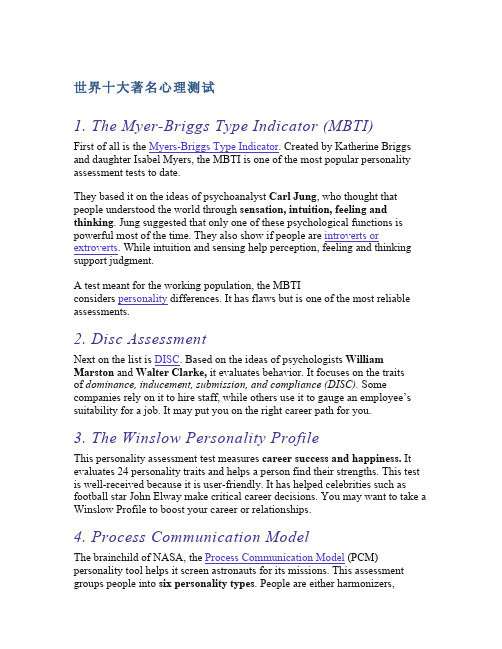
世界十大著名心理测试1. The Myer-Briggs Type Indicator (MBTI)First of all is the Myers-Briggs Type Indicator. Created by Katherine Briggs and daughter Isabel Myers, the MBTI is one of the most popular personality assessment tests to date.They based it on the ideas of psychoanalyst Carl Jung, who thought that people understood the world through sensation, intuition, feeling and thinking. Jung suggested that only one of these psychological functions is powerful most of the time. They also show if people are introverts or extroverts. While intuition and sensing help perception, feeling and thinking support judgment.A test meant for the working population, the MBTIconsiders personality differences. It has flaws but is one of the most reliable assessments.2. Disc AssessmentNext on the list is DISC. Based on the ideas of psychologists William Marston and Walter Clarke, it evaluates behavior. It focuses on the traitsof dominance, inducement, submission, and compliance (DISC). Some companies rely on it to hire staff, while others use it to gauge an employee’s suitability for a job. It may put you on the right career path for you.3. The Winslow Personality ProfileThis personality assessment test measures career success and happiness. It evaluates 24 personality traits and helps a person find their strengths. This test is well-received because it is user-friendly. It has helped celebrities such as football star John Elway make critical career decisions. You may want to take a Winslow Profile to boost your career or relationships.4. Process Communication ModelThe brainchild of NASA, the Process Communication Model (PCM) personality tool helps it screen astronauts for its missions. This assessment groups people into six personality types. People are either harmonizers,thinkers, rebels, imagineers, persisters, or promoters. Since this test assesses personal strengths, it may show yours and lead you to the perfect career. 5. The Holtzman Inkblot TechniqueThe Holtzman Inkblot Technique, created by Walter H. Holtzman, assesses personalities with ink blots. It addresses issues in the Rorschach test, a similar type of assessment. The Rorschach test faced criticism because it did not include specific criteria. Therefore, skeptics felt that it was pseudoscience. Unlike its predecessor, the Holtzman test considered criteria such as the reaction time, rejection, place, space, and form of ink blots. The improvements have made it a popular personality assessment.6. Hexaco Personality InventoryAs its name suggests, the Hexaco Personality Inventory tests six characteristics of Humility, Emotionality, Extraversion, Agreeableness, Conscientiousness, and Openness to experience. It assesses a person based on the adjectives that fall under these categories. They are as follows: •Humility (H): Fairness, Sincerity, Greed Avoidance•Emotionality(E): Courage, Anxiety, Sentimentality, and dependence •Extraversion (X): Social self-esteem, boldness, liveliness•Agreeableness (A) Willingness to forgive, Flexibility, Gentleness, and Patience•Conscientiousness(C): Organization, Perfectionism, Diligence, and Prudence•Openness to Experience (O): Appreciation, Inquisitiveness, and CreativityCritics say that this test is inaccurate because it does not consider cultural differences.Nevertheless, it still makes a reliable tool for companies and people.7. The Revised Neo Personality Inventory (NeoPi-R)Also on the list is the Neo Pi-R, a revised version of the Neo Personality Theory developed by Paul Costa and Robert McCrae. It evaluates people based on the traits of Extraversion, Conscientiousness, Agreeableness,Neuroticism, and Openness to Experience. Almost like the Hexaco theory, it assesses descriptive adjectives that fall under categories:•Neuroticism: Anxiety, Hostility, Depression, Self-consciousness, Impulsiveness and Vulnerability to Stress•Extraversion: Gregaropismess. Assertiveness, Activity, Excitement-seeking and Positivism•Openness to Experience: Fantasy, Aesthetics, Feelings, Actions, Ideas and Values•Agreeableness: Trust, Straightforwardness, Altruism, Compliance, Modesty, and Tenderness•Conscientiousness: Competence, Order, Dutifulness, Achievement Striving, Self-Discipline, and DeliberationWhile this test considers many factors, it does not address social bias. It assumes that people are honest at all times, but this is untrue. In high stakes situations like job interviews, most people present themselves in a better light than usual. That said, you may want to try it yourself because it is comprehensive.8. The Personality Assessment SystemDeveloped by former CIA psychologist John W. Gittinger, the Personality Assessment System (PAS) assesses personality profiles.Unlike other personality assessment tests, it uses the Wechsler Scales subtests to decide a person’s intelligence and skills. The Wechsler Adult Intelligence Scale gathers character information. It also considers character formation and development. Companies find it useful because it provides psychological information.9. The Birkman MethodAnother test is the Birkman Method. Developed by Roger Birkman, it measures a person’s reaction to stress. It also considers strengths and social behavior. Studies like the Classical Test Theory and the Item Response Theory support its reliability. Because it is quite detailed, you may want to try it for yourself.10. The EnneagramThe last test the Enneagram, a model of 9 personality types. Based on the work of Oscar Ichazo and Claudio Naranjo, it represents these personality types in a geometric figure. They include:•Reformers•Helpers•Achievers•Individualists•Investigators•Loyalists•Enthusiasts•Challengers•Peacemakers.The Enneagram has a circle, an inner triangle, and a hexagon. The ring explains how the different personalities unite while the triangle shows how three nearby characters may influence each character. The hexagon, in arithmetic, is the decimal figure derived from dividing one by seven. It is a well-received assessment because it is thorough.Consequently, knowing your Enneagram type may boost your career.In conclusion, give these personality tests a try, because they may improve your life in ways that you do not realize.。
世界著名心理实验
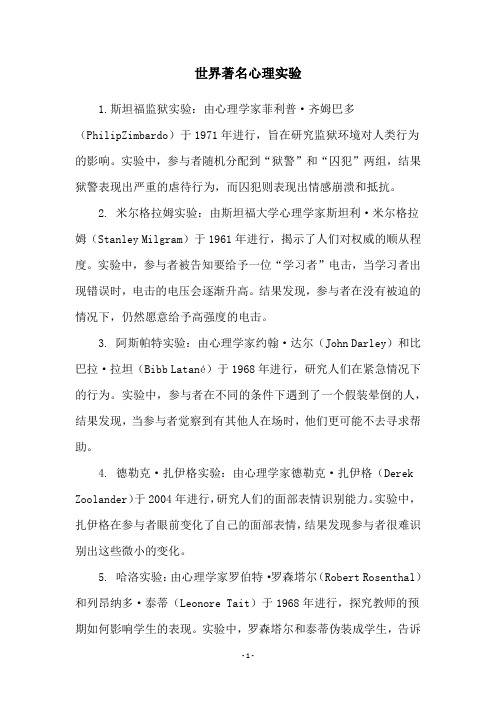
世界著名心理实验
1.斯坦福监狱实验:由心理学家菲利普·齐姆巴多(PhilipZimbardo)于1971年进行,旨在研究监狱环境对人类行为的影响。
实验中,参与者随机分配到“狱警”和“囚犯”两组,结果狱警表现出严重的虐待行为,而囚犯则表现出情感崩溃和抵抗。
2. 米尔格拉姆实验:由斯坦福大学心理学家斯坦利·米尔格拉姆(Stanley Milgram)于1961年进行,揭示了人们对权威的顺从程度。
实验中,参与者被告知要给予一位“学习者”电击,当学习者出现错误时,电击的电压会逐渐升高。
结果发现,参与者在没有被迫的情况下,仍然愿意给予高强度的电击。
3. 阿斯帕特实验:由心理学家约翰·达尔(John Darley)和比巴拉·拉坦(Bibb Latané)于1968年进行,研究人们在紧急情况下的行为。
实验中,参与者在不同的条件下遇到了一个假装晕倒的人,结果发现,当参与者觉察到有其他人在场时,他们更可能不去寻求帮助。
4. 德勒克·扎伊格实验:由心理学家德勒克·扎伊格(Derek Zoolander)于2004年进行,研究人们的面部表情识别能力。
实验中,扎伊格在参与者眼前变化了自己的面部表情,结果发现参与者很难识别出这些微小的变化。
5. 哈洛实验:由心理学家罗伯特·罗森塔尔(Robert Rosenthal)和列昂纳多·泰蒂(Leonore Tait)于1968年进行,探究教师的预期如何影响学生的表现。
实验中,罗森塔尔和泰蒂伪装成学生,告诉
教师他们是智力水平较高的学生,结果发现这些学生的表现比其他学生更好,这表明了教师的预期对学生表现的影响。
著名心理学测试
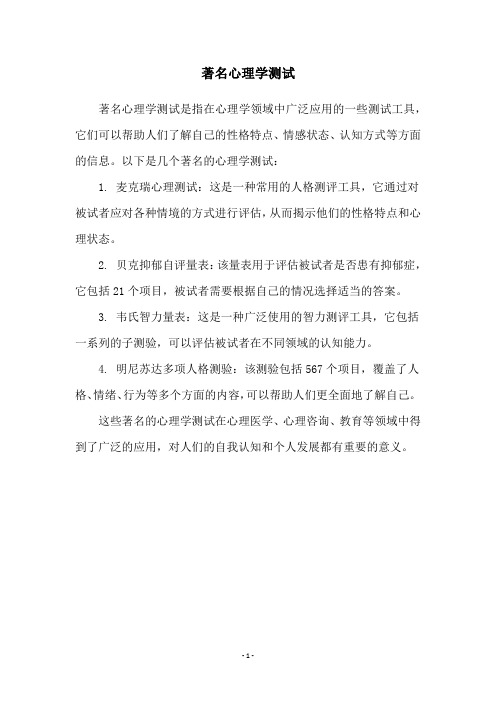
著名心理学测试
著名心理学测试是指在心理学领域中广泛应用的一些测试工具,它们可以帮助人们了解自己的性格特点、情感状态、认知方式等方面的信息。
以下是几个著名的心理学测试:
1. 麦克瑞心理测试:这是一种常用的人格测评工具,它通过对被试者应对各种情境的方式进行评估,从而揭示他们的性格特点和心理状态。
2. 贝克抑郁自评量表:该量表用于评估被试者是否患有抑郁症,它包括21个项目,被试者需要根据自己的情况选择适当的答案。
3. 韦氏智力量表:这是一种广泛使用的智力测评工具,它包括一系列的子测验,可以评估被试者在不同领域的认知能力。
4. 明尼苏达多项人格测验:该测验包括567个项目,覆盖了人格、情绪、行为等多个方面的内容,可以帮助人们更全面地了解自己。
这些著名的心理学测试在心理医学、心理咨询、教育等领域中得到了广泛的应用,对人们的自我认知和个人发展都有重要的意义。
- 1 -。
世界十大著名心理测试(其三)
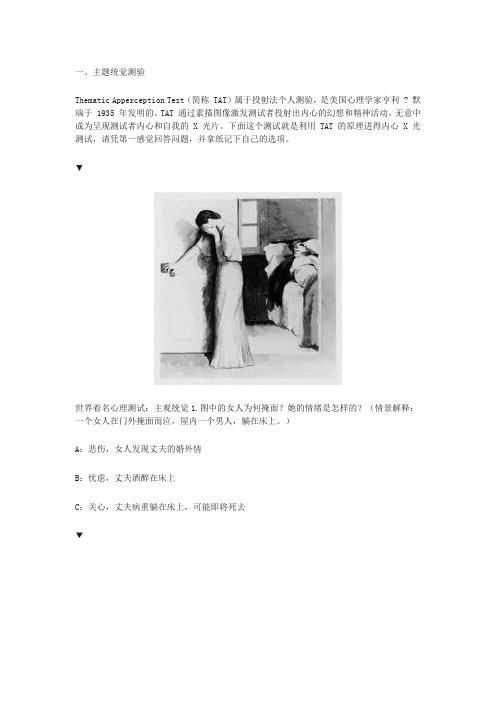
一、主题统觉测验Thematic Apperception Test(简称 TAT)属于投射法个人测验,是美国心理学家亨利 ? 默瑞于 1935 年发明的。
TAT 通过素描图像激发测试者投射出内心的幻想和精神活动,无意中成为呈现测试者内心和自我的 X 光片。
下面这个测试就是利用 TAT 的原理进得内心 X 光测试,请凭第一感觉回答问题,并拿纸记下自己的选项。
▼世界着名心理测试:主观统觉1.图中的女人为何掩面?她的情绪是怎样的?(情景解释:一个女人在门外掩面而泣,屋内一个男人,躺在床上。
)A:悲伤,女人发现丈夫的婚外情B:忧虑,丈夫酒醉在床上C:关心,丈夫病重躺在床上,可能即将死去▼2.床上女子状态怎样?(情景解释:一个女人躺在床上,一只生臂垂落床沿,一个人背对着她掩着面。
)A:身患重病B:沉睡C:已死去▼3.图中戴领结的男子是女子的什么人?(情景解释:有两幅画面,第一幅是一个秃顶男人弯着腰从窗缝向屋内看,第二幅是一个女人头靠在男人胸前,仰面看着男人,男人也低头看着她。
)A:秘密情人B:老板或者顶头上司C:可以帮助她的有权有势的人▼4.图中老妇人的眼神流露出怎样的情绪?(情景解释:一个中年妇女面朝前方面无表情,一个满脸皱纹的老人一脸凝重,托着下巴,眼神古怪在中年妇女背后。
)A:邪恶,她们之间可能隐藏着冲突B:同情C:焦虑,关心▼5.图中的女子正在打开房门,她打算做什么?(情景解释:一个女子刚打开房门,还没进房,探出半个身子。
房间里有一支插花,一只闹钟,一把椅子,还有一面可能是镜子。
)A:男友的房间,她一直很想看看房间里的布局陈设B:下班,刚刚回家C:拿东西,然后回厨房做饭▼6.图中这个人物打扮成这样是为什么?(情景解释:图中的人物打扮得很怪,很抽像,描绘不出是什么样子。
)A:打扮成别人认不出来的样子去袭击仇人B:抢劫商店C:参加万圣节假面舞会▼7.图中这个女子化妆是为什么?(情景解释:图中有位女子坐有镜前化妆,但看不到她的正面。
世界十大著名心理测试
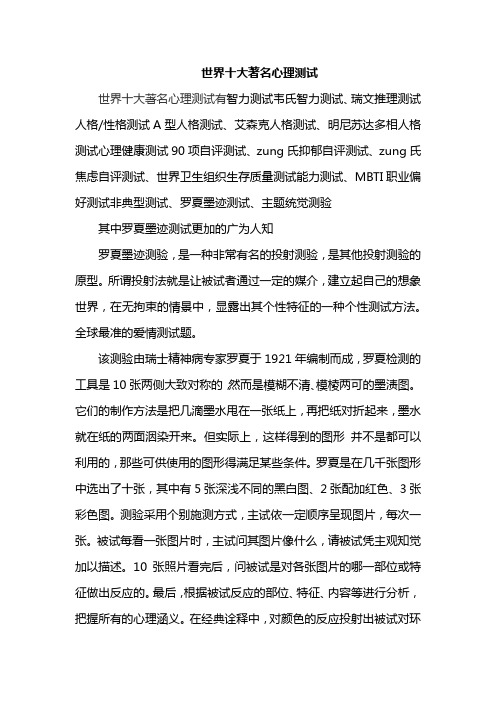
世界十大著名心理测试世界十大著名心理测试有智力测试韦氏智力测试、瑞文推理测试人格/性格测试A型人格测试、艾森克人格测试、明尼苏达多相人格测试心理健康测试90项自评测试、zung氏抑郁自评测试、zung氏焦虑自评测试、世界卫生组织生存质量测试能力测试、MBTI职业偏好测试非典型测试、罗夏墨迹测试、主题统觉测验其中罗夏墨迹测试更加的广为人知罗夏墨迹测验,是一种非常有名的投射测验,是其他投射测验的原型。
所谓投射法就是让被试者通过一定的媒介,建立起自己的想象世界,在无拘束的情景中,显露出其个性特征的一种个性测试方法。
全球最准的爱情测试题。
该测验由瑞士精神病专家罗夏于1921年编制而成,罗夏检测的工具是10张两侧大致对称的,然而是模糊不清、模棱两可的墨渍图。
它们的制作方法是把几滴墨水甩在一张纸上,再把纸对折起来,墨水就在纸的两面洇染开来。
但实际上,这样得到的图形并不是都可以利用的,那些可供使用的图形得满足某些条件。
罗夏是在几千张图形中选出了十张,其中有5张深浅不同的黑白图、2张配加红色、3张彩色图。
测验采用个别施测方式,主试依一定顺序呈现图片,每次一张。
被试每看一张图片时,主试问其图片像什么,请被试凭主观知觉加以描述。
10张照片看完后,问被试是对各张图片的哪一部位或特征做出反应的。
最后,根据被试反应的部位、特征、内容等进行分析,把握所有的心理涵义。
在经典诠释中,对颜色的反应投射出被试对环境的情绪反馈,对形状与位置的反应可视为总体生活取向的指标等等。
该测验在临床诊断中应用较多,主要优点在于为医患双方提供了开放交流的机会,其效用性依赖于测验者的敏感、共情与洞察力。
由于该测验的记分与解释系统极为复杂,所以必须经过较长时间的专业训练才可掌握使用。
需要注意的是该测验本身主观性较强,其效度测评尚无可靠证据。
测试时要求受试人看过每一张图形后进行自由联想:这一张图或这张图的某一部分,或把图片旋转后象什么、想到了什么,都报告出来。
世界十大著名心理测试
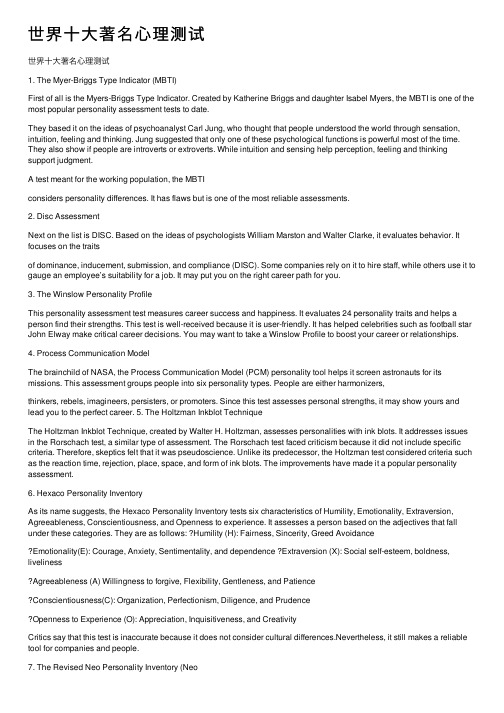
?Conscientiousness(C): Organization, Perfectionism, Diligence, and Prudence
?Openness to Experience (O): Appreciation, Inquisitiveness, and Creativity
Critics say that this test is inaccurate because it does not consider cultural differences.Nevertheless, it still makes a reliable tool for companies and people.
- 1、下载文档前请自行甄别文档内容的完整性,平台不提供额外的编辑、内容补充、找答案等附加服务。
- 2、"仅部分预览"的文档,不可在线预览部分如存在完整性等问题,可反馈申请退款(可完整预览的文档不适用该条件!)。
- 3、如文档侵犯您的权益,请联系客服反馈,我们会尽快为您处理(人工客服工作时间:9:00-18:30)。
1.The Myer-Briggs Type Indicator (MBTI) First of all is the Myers-Briggs Type Indicator. Created by Katherine Briggs and daughter Isabel Myers, the MBTI is one of the most popular personality assessment tests to date. They based it on the ideas of psychoanalyst Carl Jung, who thought that people understood the world through sensation, intuition, feeling and thinking. Jung suggested that only one of these psychological functions is powerful most of the time. They also show if people are introverts or extroverts. While intuition and sensing help perception, feeling and thinking support judgment. A test meant for the working population, the MBTI considers personality differences. It has flaws but is one of the most reliable assessments.2.Disc Assessment Next on the list is DISC. Based on the ideas of psychologists William Marston and Walter Clarke, it evaluates behavior. It focuses on the traits of dominance, inducement, submission, and compliance (DISC). Some companies rely on it to hire staff, while others use it to gauge an employee’s suitability for a job. It may put you on the right career path for you.3.The Winslow Personality Profile This personality assessment test measures career success and happiness. Itevaluates 24 personality traits and helps a person find their strengths. This test is well-received because it is user-friendly. It has helped celebrities such as football star John Elway make critical career decisions. You may want to take a Winslow Profile to boost your career or relationships.4.Process Communication Model The brainchild of NASA, the Process Communication Model (PCM) personality tool helps it screen astronauts for its missions. This assessment groups people into six personality types. People are either harmonizers, thinkers, rebels, imagineers, persisters, or promoters. Since this test assesses personal strengths, it may show yours and lead you to the perfect career.5.The Holtzman Inkblot Technique The Holtzman Inkblot Technique, created by Walter H. Holtzman, assesses personalities with ink blots. It addresses issues in the Rorschach test, a similar type of assessment. The Rorschach test faced criticism because it did not include specific criteria. Therefore, skeptics felt that it was pseudoscience. Unlike its predecessor, the Holtzman test considered criteria such as the reaction time, rejection, place, space, and form of ink blots. The improvements have made it a popular personality assessment.6.Hexaco Personality Inventory As its name suggests, the Hexaco Personality Inventory tests six characteristics of Humility, Emotionality, Extraversion, Agreeableness, Conscientiousness, and Openness to experience. It assesses a person based on the adjectives that fall under these categories. They are as follows: ? Humility (H): Fairness, Sincerity, Greed Avoidance ? Emotionality(E): Courage, Anxiety, Sentimentality, and dependence ? Extraversion (X): Social self-esteem, boldness, liveliness ? Agreeableness (A) Willingness to forgive, Flexibility, Gentleness, and Patience ? Conscientiousness(C): Organization, Perfectionism, Diligence, and Prudence ? Openness to Experience (O): Appreciation, Inquisitiveness, and Creativity Critics say that this test is inaccurate because it does not consider cultural differences.Nevertheless, it still makes a reliable tool for companies and people.7.The Revised Neo Personality Inventory (Neo Pi-R) Also on the list is the Neo Pi-R, a revised version of the Neo Personality Theory developed by Paul Costa and Robert McCrae. It evaluates people based on the traits of Extraversion, Conscientiousness, Agreeableness, Neuroticism, and Openness to Experience. Almost like the Hexaco theory, it assesses descriptive adjectives that fall under categories: ?Neuroticism: Anxiety, Hostility, Depression, Self-consciousness, Impulsiveness and Vulnerability to Stress ? Extraversion: Gregaropismess. Assertiveness, Activity, Excitementseeking and Positivism ? Openness to Experience: Fantasy, Aesthetics, Feelings, Actions, Ideas and Values ? Agreeableness: Trust, Straightforwardness, Altruism, Compliance, Modesty, and Tenderness ? Conscientiousness: Competence, Order, Dutifulness, Achievement Striving, Self-Discipline, and Deliberation While this test considers many factors, it does not address social bias. It assumes that people are honest at all times, but this is untrue. In high stakes situations like job interviews, most people present themselves in a better light than usual. That said, you may want to try it yourself because it is comprehensive.8.The Personality Assessment System Developed by former CIA psychologist John W. Gittinger, the Personality Assessment System (PAS) assesses personality profiles. Unlike other personality assessment tests, it uses the Wechsler Scales subtests to decide a person’s intelligence and skills. The Wechsler Adult Intelligence Scale gathers character information. It also considers character formation and development. Companies find it useful because it providespsychological information.9. The Birkman Method Another test is the Birkman Method. Developed by Roger Birkman, it measures a person’s reaction to stress. It also considers strengths and social behavior. Studies like the Classical Test Theory and the Item Response Theory support its reliability. Because it is quite detailed, you may want to try it for yourself. 10. The Enneagram The last test the Enneagram, a model of 9 personality types. Based on the work of Oscar Ichazo and Claudio Naranjo, it represents these personality types in a geometric figure. They include: ? Reformers ? Helpers ? Achievers ? Individualists ? Investigators ? Loyalists ? Enthusiasts ? Challengers ? Peacemakers. The Enneagram has a circle, an inner triangle, and a hexagon. The ring explains how the different personalities unite while the triangle shows how three nearby characters may influence each character. The hexagon, in arithmetic, is the decimal figure derived from dividing one by seven. It is a well-received assessment because it is thorough. Consequently, knowing your Enneagram type may boost your career. In conclusion, give these personality tests a try, because they may improve your life in ways that you do not realize.。
